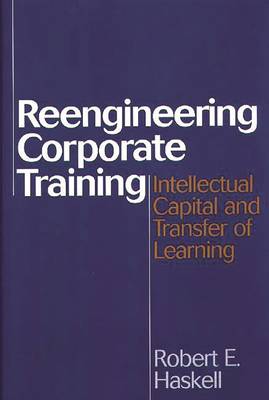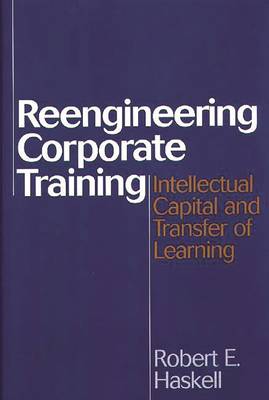
- Afhalen na 1 uur in een winkel met voorraad
- Gratis thuislevering in België vanaf € 30
- Ruim aanbod met 7 miljoen producten
- Afhalen na 1 uur in een winkel met voorraad
- Gratis thuislevering in België vanaf € 30
- Ruim aanbod met 7 miljoen producten
Reengineering Corporate Training
Intellectual Capital and Transfer of Learning
Robert E HaskellOmschrijving
Haskell emphasizes that traditional, industry-based methods of training are inappropriate, and in fact, unworkable in today's complex, knowledge-based organizations. Instead of simple rote, task-limited, short-run training, organizations must find ways to give their employees thought-based, task-extended, high-performance, and long-run learning. Haskell thus shows that the goal of training is the transfer of learning, and this is not just simple training. What it is, how it works, and how organizations can achieve it are explained in a highly readable, thought-provoking and challenging way. Traditionalists may be skeptical, but Haskell's approach provides a general framework to help understand how to think in terms of learning transfer. His book will be important, compelling reading not only for those in the academic community, but for training and development professionals throughout the public and private sectors.
Haskell argues that the training function must be reorganized from the traditional format that most organizations use to one that emphasizes the true acquisition of knowledge. In order to make this change, a fundamental concept--transfer of learning--must be understood. Based on a review of 90 years of research as well as his own experiences and findings, Haskell presents a new transfer of learning framework integrating all of the current training systems, mental models, systems archetypes, and generic thinking in the workplace. In doing so he provides the missing instructional foundations for all training and learning, and especially for what have come to be called learning organizations. He argues that half the $70 billion spent on training in business and industry is wasted, simply because what people are taught in class is not transferred to and maintained on the job.
Specificaties
Betrokkenen
- Auteur(s):
- Uitgeverij:
Inhoud
- Aantal bladzijden:
- 224
- Taal:
- Engels
Eigenschappen
- Productcode (EAN):
- 9781567201482
- Verschijningsdatum:
- 18/02/1998
- Uitvoering:
- Hardcover
- Formaat:
- Genaaid
- Afmetingen:
- 163 mm x 241 mm
- Gewicht:
- 557 g

Alleen bij Standaard Boekhandel
Beoordelingen
We publiceren alleen reviews die voldoen aan de voorwaarden voor reviews. Bekijk onze voorwaarden voor reviews.











